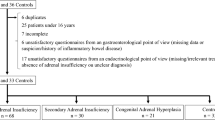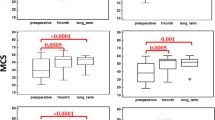Abstract
Purpose
Several studies have shown a reduced quality of life (QoL) in patients with Addison’s disease (AD), but investigations of QoL over a long-term course are lacking. Adrenal crises (AC) are life-threatening complications in AD. The purpose of this prospective study was to test whether the repeated use of QoL-questionnaires can detect prodromal periods of an AC.
Methods
110 patients with AD were asked to complete the disease specific-QoL questionnaire AddiQoL and a short questionnaire about adverse events once monthly over a period of ten months. AC was defined if at least two of the following symptoms were reported: (a) hypotension, (b) nausea or vomiting, (c) severe fatigue, (d) documented hyponatremia, hyperkalemia, or hypoglycemia, and subsequent parenteral glucocorticoid administration was carried out.
Results
Prevalence of AC was 10.9/100 patient years. AddiQoL scores in patients with AC showed a trend (p = 0,08) to a wider fluctuation over time. Subjective precrises not meeting the criteria for AC were reported by 31 patients who had significantly lower AddiQoL scores (p = 0,018).
Conclusions
These are the first data showing the course of QoL during a period of ten months in patients with AD. Incidence of AC exceeds previous data. Our data show, that subjective precrises in AD associate with lower QoL. AC, as well as precrises affect intraindividual AddiQol-scores over time with a trend to a stronger fluctuation. Longitudinal AddiQol scores and self-reporting of precrises via patient diaries are additional clinical tools to identify higher risk for critical events.


Similar content being viewed by others
References
S. Hahner, M. Loeffler, B. Bleicken et al., Epidemiology of adrenal crisis in chronic adrenal insufficiency: the need for new prevention strategies. Eur. J. Endocrinol. 162, 597–602 (2010)
L.C. Smans, E.S. Van der Valk, A.R. Hermus, P.M. Zelissen, Incidence of adrenal crisis in patients with adrenal insufficiency. Clin. Endocrinol. 84, 17–22 (2016)
S. Hahner, C. Spinnler, M. Fassnacht, et al., High incidence of adrenal crisis in educated patients with chronic adrenal insufficiency: a prospective study. J. Clin. Endocrinol. Metab. 100, 407–416 (2015)
G. Meyer, K. Badenhoop, R. Linder, Addison’s disease with polyglandular autoimmunity carries a more than 2.5-fold risk for adrenal crises: German Health insurance data 2010-2013. Clin. Endocrinol. 85, 347–353 (2016)
K. White, W. Arlt, Adrenal crisis in treated Addison’s disease: a predictable but under-managed event. Eur. J. Endocrinol. 162, 115–120 (2010)
T.H. Puar, N.M. Stikkelbroeck, L.C. Smans et al., Adrenal crisis: still a deadly event in the 21st century. Am. J. Med. 129(339), e1–e9 (2016)
B. Bleicken, S. Hahner, M. Loeffler et al., Impaired subjective health status in chronic adrenal insufficiency: impact of different glucocorticoid replacement regimens. Eur. J. Endocrinol. 159, 811–817 (2008)
S. Hahner, M. Loeffler, M. Fassnacht et al., Impaired subjective health status in 256 patients with adrenal insufficiency on standard therapy based on cross-sectional analysis. J. Clin. Endocrinol. Metab. 92, 3912–3922 (2007)
K. Lovas, J.H. Loge, E.S. Husebye, Subjective health status in Norwegian patients with Addison’s disease. Clin. Endocrinol. (Oxf.). 56, 581–588 (2002)
J. Tiemensma, C.D. Andela, A.A. Kaptein et al., Psychological morbidity and impaired quality of life in patients with stable treatment for primary adrenal insufficiency: cross-sectional study and review of the literature. Eur. J. Endocrinol. 171, 171–182 (2014)
K. Lovas, S. Curran, M. Oksnes et al., Development of a disease-specific quality of life questionnaire in Addison’s disease. J. Clin. Endocrinol. Metab. 95, 545–551 (2010)
M. Oksnes, S. Bensing, A.L. Hulting et al., Quality of life in European patients with Addison’s disease: validity of the disease-specific questionnaire AddiQoL. J. Clin. Endocrinol. Metab. 97, 568–576 (2012)
L. Gagliardi, M.A. Nenke, T.R. Thynne et al., Continuous subcutaneous hydrocortisone infusion therapy in Addison’s disease: a randomized, placebo-controlled clinical trial. J. Clin. Endocrinol. Metab. 99, 4149–4157 (2014)
J. Langenheim, M. Ventz, A. Hinz, M. Quinkler, Modified-release prednisone decreases complaints and fatigue compared to standard prednisolone in patients with adrenal insufficiency. Horm. Metab. Res. 45, 96–101 (2013)
M. Quinkler, R. Miodini Nilsen, K. Zopf et al., Modified-release hydrocortisone decreases BMI and HbA1c in patients with primary and secondary adrenal insufficiency. Eur. J. Endocrinol. 172, 619–626 (2015)
G. Meyer, A. Hackemann, M. Penna-Martinez, K. Badenhoop, What affects the quality of life in autoimmune Addison’s disease? Horm. Metab. Res. 45, 92–95 (2013)
A.H. Heald, A. Walther, J.R.E. Davis et al., No difference in mood and quality of life in dhea-s deficient adults with addison’s disease vs. type 2 diabetes patients with normal DHEA-S levels: implications for management of these conditions. Front Psychol. 8, 764 (2017)
M. Henry, P.S. Wolf, I.L. Ross, K.G. Thomas, Poor quality of life, depressed mood, and memory impairment may be mediated by sleep disruption in patients with Addison’s disease. Physiol. Behav. 151, 379–385 (2015)
S.R. Bornstein, B. Allolio, W. Arlt et al., Diagnosis and treatment of primary adrenal insufficiency: an endocrine society clinical practice guideline. J. Clin. Endocrinol. Metab. 101, 364–389 (2016)
E.S. Husebye, B. Allolio, W. Arlt et al., Consensus statement on the diagnosis, treatment and follow-up of patients with primary adrenal insufficiency. J. Intern. Med. 275, 104–115 (2014)
H.J. Repping-Wuts, N.M. Stikkelbroeck, A. Noordzij et al., A glucocorticoid education group meeting: an effective strategy for improving self-management to prevent adrenal crisis. Eur. J. Endocrinol. 169, 17–22 (2013)
P. Tyrer, S. Cooper, M. Crawford et al., Prevalence of health anxiety problems in medical clinics. J. Psychosom. Res. 71, 392–394 (2011)
P.M. Stewart, B.M. Biller, C. Marelli et al., Exploring inpatient hospitalizations and morbidity in patients with adrenal insufficiency. J. Clin. Endocrinol. Metab. 101, 4843–4850 (2016)
J. Daniels, E. Sheils, A complex interplay: cognitive behavioural therapy for severe health anxiety in Addison’s disease to reduce emergency department admissions. Behav. Cogn. Psychother. 45, 419–426 (2017)
J. Daniels, J.M. Turner-Cobb, Adjuvant psychological therapy in long-term endocrine conditions. Clin. Endocrinol. 86, 772–777 (2017)
S. Hahner, N. Hemmelmann, M. Quinkler et al., Timelines in the management of adrenal crisis-targets, limits and reality. Clin. Endocrinol. (Oxf.). 82, 497–502 (2015)
C. Leblicq, D. Rottembourg, J. Deladoey et al., Are guidelines for glucocorticoid coverage in adrenal insufficiency currently followed? J. Pediatr. 158, 492–498 (2011). e1
Acknowledgements
We thank Reinhard Santen (Endocrinological Group Practice, Centre for hormonal disorders and metabolic diseases, Frankfurt, Germany), Alexander Mann (Endokrinologikum Frankfurt am Main, Centre for Endocrinology and Metabolism, Rheumatology and Neurology, Germany), Michael Droste (Medicover, ambulatory healthcare centre, Oldenburg, Germany), Antje Spens (Ambulatory healthcare centre for metabolic diseases, Leipzig, Germany), Nina Krause and Martin Merkel (Endokrinologikum, ambulatory healthcare centre, Hannover, Germany) and the patient support group “Netzwerk“ for their support in recruitment of patients and acquisition of data. Special thanks to our study coordinator Maria Sandler. This study was supported by the European Union 7th framework Health programme FP7 with the acronym EURADRENAL under the grant agreement 2008-201167.
Author information
Authors and Affiliations
Corresponding author
Ethics declarations
Conflict of interest
The authors declare that they have no conflict of interest.
Rights and permissions
About this article
Cite this article
Meyer, G., Koch, M., Herrmann, E. et al. Longitudinal AddiQoL scores may identify higher risk for adrenal crises in Addison’s disease. Endocrine 60, 355–361 (2018). https://doi.org/10.1007/s12020-017-1513-0
Received:
Accepted:
Published:
Issue Date:
DOI: https://doi.org/10.1007/s12020-017-1513-0




